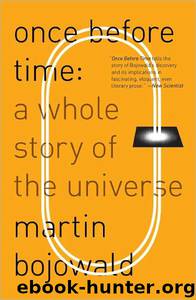Once Before Time by Martin Bojowald

Author:Martin Bojowald
Language: eng
Format: mobi, epub
Tags: Science
ISBN: 9780307272850
Publisher: Knopf
Published: 2009-01-02T00:00:00+00:00
INFLATION: SPECULATING ON THE EARLY UNIVERSE
Negative pressure can suspend the purely attractive nature of gravity in general relativity, so could it perhaps be important to prevent singularities? For this purpose, unlike for dark energy, matter under negative pressure would have to be distributed not in a wide universe of current size but in the small early universe near the big bang. In the early universe we can be quite sure of the homogeneity assumption, thanks to the detailed observations of background microwaves. Moreover, densities and temperatures were much higher than they are now, possibly allowing quantum theory to play a larger role.
Negative pressure in the early universe is called inflation,5 with an allusion to the inflationary—accelerated—expansion of the universe. While inflation’s negative pressure could be suspected to help prevent the total collapse of a small universe seen in reverse, it is not strong enough. It does contribute a kind of repulsive force, but as shown (under certain conditions) a few years ago by Arvind Borde, Alan Guth, and Alex Vilenkin, it cannot prevent the singularity completely. Alan Guth was the first to introduce the theory of cosmic inflation in 1981, when he emphasized other advantages independent of the singularity problem. (At the same time there were similar, but not much noticed, articles by other authors.)
Inflationary research can be seen as a kind of template for quantum gravity: It remained speculative for decades, driven mainly by principles and perceived inconsistencies rather than by experimental input. Only in recent years has it come close to observational contact, and by now some models can already be ruled out. On a smaller scale—efforts were not as intense and prolonged as they have been for quantum gravity, and mathematically the field is much less challenging—we can thus observe how good a theoretical framework that is blind in its experimental eye can be. Inflation does have a major, mind-boggling consequence: It can explain how everything we know, including ourselves, arose from quantum fluctuations in an initially empty universe.
Although inflation has never been observed directly, it presents an elegant mechanism to explain other observations of matter distributions in the universe. It is also one of the most energetic phenomena known with at least some indirect access, and so it is of considerable interest as a tool with which to probe quantum gravity. Densities during inflation were not as high as the Planck density, but in typical scenarios they come close to at least about a millionth of its value. With the immense size of the Planck density—those trillion suns compressed to the size of a proton—this is as good as it gets. Consequently, models to combine the various approaches to quantum gravity with inflation, or even to derive inflation as a necessary consequence of some model, abound. Details and long-term consequences of such a quantum-gravity-induced early-universe episode could be used to test ideas for quantizing gravity.6
String theory, as always, has provided the largest variety of scenarios to possibly result in an explanation of inflation. This achievement is
Download
This site does not store any files on its server. We only index and link to content provided by other sites. Please contact the content providers to delete copyright contents if any and email us, we'll remove relevant links or contents immediately.
The Complete Stick Figure Physics Tutorials by Allen Sarah(7361)
Secrets of Antigravity Propulsion: Tesla, UFOs, and Classified Aerospace Technology by Ph.D. Paul A. Laviolette(5363)
Thing Explainer by Randall Munroe(3927)
The River of Consciousness by Oliver Sacks(3590)
The Order of Time by Carlo Rovelli(3179)
How To by Randall Munroe(3098)
A Brief History of Time by Stephen Hawking(3013)
I Live in the Future & Here's How It Works by Nick Bilton(2977)
What If?: Serious Scientific Answers to Absurd Hypothetical Questions by Randall Munroe(2691)
The Great Unknown by Marcus du Sautoy(2684)
Midnight in Chernobyl by Adam Higginbotham(2531)
Blockchain: Ultimate Step By Step Guide To Understanding Blockchain Technology, Bitcoin Creation, and the future of Money (Novice to Expert) by Keizer Söze(2477)
Networks: An Introduction by Newman Mark(2399)
The Meaning of it All by Richard Feynman(2338)
Easy Electronics by Charles Platt(2322)
The Tao of Physics by Fritjof Capra(2258)
Midnight in Chernobyl: The Untold Story of the World's Greatest Nuclear Disaster by Adam Higginbotham(2215)
Introducing Relativity by Bruce Bassett(2111)
When by Daniel H Pink(2109)
